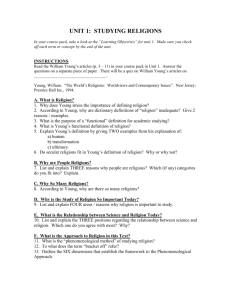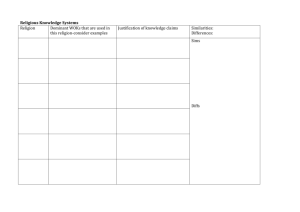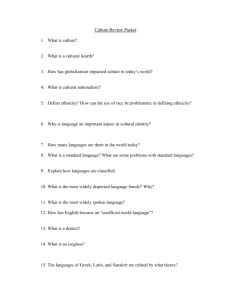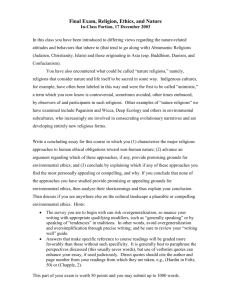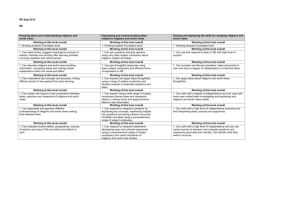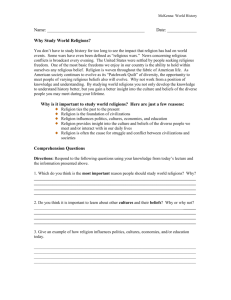world religions
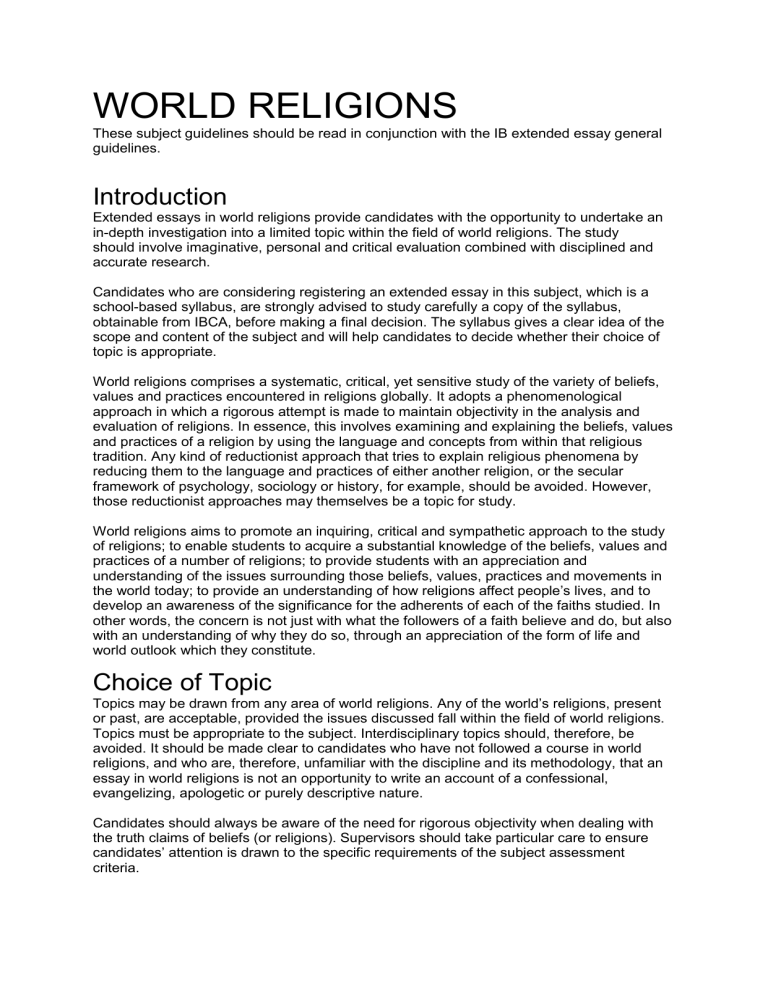
WORLD RELIGIONS
These subject guidelines should be read in conjunction with the IB extended essay general guidelines.
Introduction
Extended essays in world religions provide candidates with the opportunity to undertake an in-depth investigation into a limited topic within the field of world religions. The study should involve imaginative, personal and critical evaluation combined with disciplined and accurate research.
Candidates who are considering registering an extended essay in this subject, which is a school-based syllabus, are strongly advised to study carefully a copy of the syllabus, obtainable from IBCA, before making a final decision. The syllabus gives a clear idea of the scope and content of the subject and will help candidates to decide whether their choice of topic is appropriate.
World religions comprises a systematic, critical, yet sensitive study of the variety of beliefs, values and practices encountered in religions globally. It adopts a phenomenological approach in which a rigorous attempt is made to maintain objectivity in the analysis and evaluation of religions. In essence, this involves examining and explaining the beliefs, values and practices of a religion by using the language and concepts from within that religious tradition. Any kind of reductionist approach that tries to explain religious phenomena by reducing them to the language and practices of either another religion, or the secular framework of psychology, sociology or history, for example, should be avoided. However, those reductionist approaches may themselves be a topic for study.
World religions aims to promote an inquiring, critical and sympathetic approach to the study of religions; to enable students to acquire a substantial knowledge of the beliefs, values and practices of a number of religions; to provide students with an appreciation and understanding of the issues surrounding those beliefs, values, practices and movements in the world today; to provide an understanding of how religions affect people’s lives, and to develop an awareness of the significance for the adherents of each of the faiths studied. In other words, the concern is not just with what the followers of a faith believe and do, but also with an understanding of why they do so, through an appreciation of the form of life and world outlook which they constitute.
Choice of Topic
Topics may be drawn from any area of world religions. Any of the world’s religions, present or past, are acceptable, provided the issues discussed fall within the field of world religions.
Topics must be appropriate to the subject. Interdisciplinary topics should, therefore, be avoided. It should be made clear to candidates who have not followed a course in world religions, and who are, therefore, unfamiliar with the discipline and its methodology, that an essay in world religions is not an opportunity to write an account of a confessional, evangelizing, apologetic or purely descriptive nature.
Candidates should always be aware of the need for rigorous objectivity when dealing with the truth claims of beliefs (or religions). Supervisors should take particular care to ensure candidates’ attention is drawn to the specific requirements of the subject assessment criteria.
The following examples of titles for world religions extended essays are intended as guidance only. The pairings illustrate that focused topics (indicated by the first title) should be encouraged rather than broad topics (indicated by the second title).
The role of creation myths in Maori religion is better than Mythology or Creation myths.
Sufism: an alternative vision for Islam in contemporary Britain is better than Mysticism in Islam.
Is the Mormon church Christian? An examination of Mormon baptism is better than
Mormonism.
The changing face of Buddhist worship: an exploration of worship in contemporary
western orders is better than Buddhist worship.
Treatment of the Topic
World religions is not concerned with testing the truth of religious beliefs, though it does embrace discussion as to what types of truth are contained in those beliefs. Nevertheless, it must include critical evaluations of, and frequent reflections on, the meanings of religious beliefs in terms of their impact on the lives, outlook and behaviour of the community of believers. So, for example, questions such as Was Mohammed the messenger of God? or
Did Jesus bar Joseph rise from the dead? are inappropriate. This does not exclude valid studies such as The concepts of prophethood and messenger in Sunni (or Shi’a) Islam, or
Magic and miracles: an examination of contemporary attitudes to miracles in the Catholic church.
Comparisons between aspects of two or more different religions are permissible, but candidates must take great care to ensure that the comparisons are on the one hand genuine, clear and specific, and on the other, a manifestation of sensitive and objective analysis. Should the candidate or the supervisor have any doubts about the candidate’s ability to meet these criteria, then a comparative study should be avoided. Comparison in religious studies means the comparing of ideas or practices, not the making of value judgements such as ‘Buddhist meditation is more effective than Christian prayer’.
It is essential that candidates demonstrate a clear, sensitive understanding. The wider implications of, and connections between, issues should be identified and explored.
The use of materials such as drawings, pictures and photographs should be encouraged where they appropriately illustrate the discussion/argument. When such materials are derived from another source, that source must be acknowledged.
Assessment Criteria
J
Balance between descriptive/narrative material and analytical material
Achievement level
0 Analysis of the descriptive/narrative material is entirely absent.
1 There is a barely adequate analysis of the descriptive/narrative material.
2 A fairly thorough analysis of the descriptive/narrative material has been attempted.
3 There is a thorough and extensive analysis of the descriptive/narrative material.
K
Objective treatment of the world religions topic
Achievement level
0 Objectivity in the treatment of the topic is entirely absent .
1 There are infrequent signs of objectivity in the treatment of the topic .
2 An adequate degree of objectivity has been achieved in the treatment of the topic.
3 A very high degree of objectivity has been achieved in the treatment of the topic.
L
Awareness and understanding of the world religions topic
Achievement level
0 Awareness and understanding of the topic are entirely absent.
1 There are infrequent signs of awareness and understanding of the topic.
2 Awareness and understanding of the topic are adequate.
3 There is a thorough and extensive awareness and understanding of the topic.
M
Sensitivity in the treatment of the world religions topic
Achievement level
0 Sensitivity in the treatment of the topic is entirely absent .
1 There are infrequent signs of sensitivity in the treatment of the topic.
2 There is adequate sensitivity in the treatment of the topic.
3 There is a very high degree of sensitivity in the treatment of the topic.

